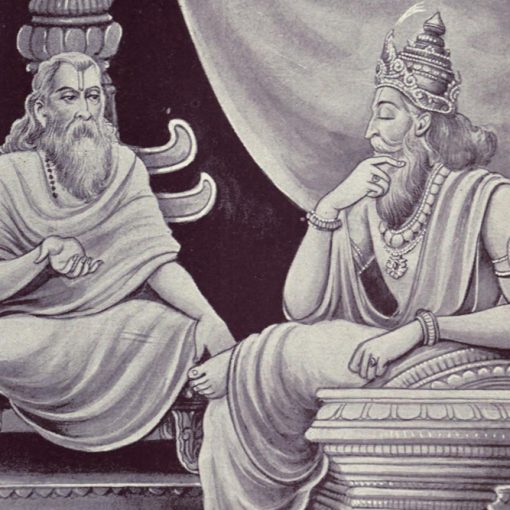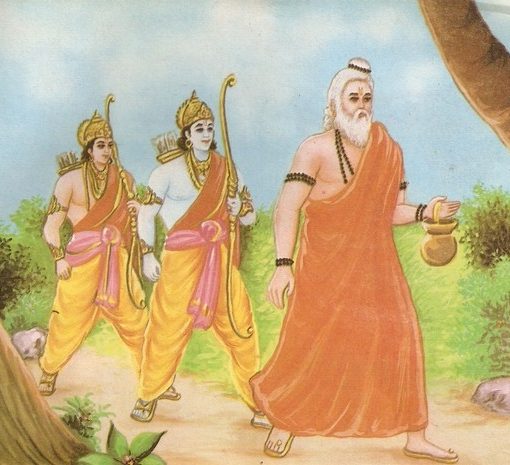The Fifteenth Chapter of the Śrīmad-Bhāgavatam offers a remarkable narrative of the Pāṇḍavas’ realization that it is time to relinquish their roles as rulers and embrace a life of renunciation. It marks a pivotal moment where the Pāṇḍavas, the heroes of the Mahābhārata, set an example of how a spiritually advanced individual transitions from worldly duties to detachment and spiritual devotion.
The Moment of Truth: Arjuna’s Heartbreaking Realization
The chapter opens with Arjuna’s return to Hastināpura from Dvārakā, and his face reflects profound sorrow and despair. He is a shadow of his former, mighty self, with the weight of devastating news heavy on his heart. King Yudhiṣṭhira, ever perceptive, senses that something catastrophic has happened, and his worst fears are confirmed—Lord Krishna has departed from this world.
Arjuna shares with his brothers the painful details of Krishna’s departure. He recalls the many pastimes of Krishna, describing how the Lord was not just his guide, charioteer, and protector but also the very essence of his life. The loss of Krishna strikes at the core of Arjuna’s being, and he feels utterly empty and helpless. He acknowledges that without Krishna, all his abilities, skills, and strength are meaningless. This realization underscores the profound truth that Krishna is the true source of all strength, success, and happiness.
Lesson:
Arjuna’s lamentation is not just personal sorrow but a spiritual awakening. His experience teaches us that material power, prestige, and even relationships are temporary, but the relationship with Krishna is eternal. In our lives, we must recognize that everything we have—our skills, talents, and successes—are ultimately Krishna’s gifts. True humility is acknowledging our dependence on Krishna in every aspect of life.
The Decline of the Kuru Dynasty: The Signs of Kaliyuga
As Arjuna laments, he also describes how the influence of Kaliyuga, the age of quarrel and hypocrisy, has begun to manifest. The moral fabric of society starts to deteriorate, and the decline of righteousness becomes evident. Arjuna’s sadness extends beyond Krishna’s departure, as he sees how adharma (unrighteousness) is spreading like wildfire. People are losing their virtues, and greed, deception, and selfishness are becoming the norm.
The Pandavas, who had always upheld dharma and ruled justly under Krishna’s guidance, find themselves in a world where their values are no longer appreciated. They realize that without Krishna’s physical presence, it is impossible to maintain the same standards of dharma in society. This recognition compels them to step back from worldly affairs and allow Kaliyuga to take its natural course.
Lesson:
The Pāṇḍavas’ decision to retire is a significant lesson in detachment and understanding the nature of time. In life, everything has a time and place. When circumstances change, it is wise to accept the shift and not cling to past glories or roles. Their departure from worldly duties teaches us that when spiritual principles cannot be maintained in a changing world, it is better to detach and focus inwardly on personal spiritual growth.
Arjuna’s Spiritual Realization: Krishna’s Withdrawal of Energy
As Arjuna recounts his experiences in Dvārakā, he recalls how he tried to use his skills to protect Krishna’s widows from looters. Despite his best efforts, he was unable to wield the same power that he once had during the Battle of Kurukshetra. Arjuna realizes that his former strength was never his own; it was always Krishna’s grace that empowered him.
Without Krishna’s presence, Arjuna feels weak, vulnerable, and incapable of defending even a group of women. This humbling experience is a turning point for Arjuna, as he fully comprehends that all worldly achievements are dependent on Krishna’s will. He realizes that Krishna had temporarily withdrawn His energy to remind Arjuna of the truth that Krishna alone is the doer.
Lesson:
Arjuna’s realization is a powerful reminder for all spiritual practitioners. It teaches us that false ego—the sense of “I am the doer”—is the root cause of material attachment and illusion. We must constantly remind ourselves that Krishna is the supreme controller, and we are merely His instruments. This awareness fosters humility and keeps us grounded in spiritual truth.
The Pāṇḍavas’ Decision to Renounce: An Exemplary Act of Detachment
After hearing about Krishna’s departure and Arjuna’s experiences, Yudhiṣṭhira and his brothers realize that their time as rulers has come to an end. They understand that the Age of Kali has begun, and the principles of Sanātana-dharma will no longer be upheld in the same way. Therefore, they decide to renounce their kingdom, wealth, and royal responsibilities.
The Pāṇḍavas’ renunciation is not born out of defeat or failure; it is an act of spiritual wisdom. They recognize that their primary duty now is to focus solely on their relationship with Krishna. They embrace the path of vairāgya (renunciation), which is essential for deepening one’s spiritual practice. By renouncing their opulent kingdom and wealth, they demonstrate that detachment from material things is necessary to attain spiritual liberation.
Lesson:
The Pāṇḍavas’ decision teaches us that life’s greatest success is not measured by material achievements but by one’s ability to surrender to God’s will and detach from material possessions. No matter how great our successes may be, they are ultimately temporary and insignificant compared to the eternal relationship with Krishna.
Draupadi’s Graceful Acceptance: The Queen’s Role in Renunciation
Draupadi, the noble wife of the Pāṇḍavas, also embraces the decision to retire to the forest. Throughout her life, Draupadi had experienced immense suffering, including humiliation, loss, and separation. Despite these hardships, she remained steadfast in her devotion to Krishna. Her acceptance of the decision to renounce royal comforts is a testament to her spiritual strength and grace.
Draupadi’s renunciation is marked by a spirit of forgiveness and acceptance. She holds no grudges against those who wronged her and sees everything as the will of Krishna. Her ability to let go of past traumas and embrace a life of spiritual focus is an inspiring example of devotional surrender.
Lesson:
Draupadi’s story teaches us the importance of forgiveness, acceptance, and detachment from past sufferings. It reminds us that holding on to grudges or material comforts only hinders spiritual progress. True spiritual strength lies in the ability to move forward with faith and devotion, trusting in Krishna’s plan.
Yudhiṣṭhira’s Departure: A Leader’s Final Act of Sacrifice
King Yudhiṣṭhira, the embodiment of righteousness, leads the way in renunciation. He performs his final duties as a king by ensuring that his successor, Mahārāja Parīkṣit, is well-prepared to rule the kingdom. Yudhiṣṭhira’s departure is marked by dignity, wisdom, and compassion for his subjects. His renunciation is not just an individual act but also a sacrifice for the greater good, as he sets an example of how a king should transition from worldly leadership to spiritual focus.
Yudhiṣṭhira’s decision to renounce the throne is a lesson in selflessness and the transient nature of power. He understands that power is not meant for personal gain but for serving society and guiding it towards spiritual values. Once the opportunity to do so has passed, it is better to relinquish power and focus on spiritual growth.
Lesson:
Yudhiṣṭhira’s departure teaches us that true leadership is defined by the willingness to sacrifice personal gain for the welfare of others. It also reminds us that worldly power, when used selflessly for Krishna’s service, becomes a means of purification rather than a cause of attachment.
The Journey of the Pāṇḍavas: A Symbol of Life’s Ultimate Goal
The Pāṇḍavas’ journey to the Himalayas symbolizes the final journey of every soul towards spiritual liberation. It is a path that involves shedding material attachments, focusing on spiritual practices, and ultimately returning to the spiritual abode of Krishna. As the Pāṇḍavas climb the mountains, they leave behind not only their kingdom but also their attachments, desires, and egos.
The symbolism of the Himalayas as a place of renunciation and spiritual realization is significant. The Pāṇḍavas’ ascent represents the gradual elevation of consciousness, from material identification to self-realization and union with God. This journey is a metaphor for the spiritual seeker’s path, which requires determination, detachment, and an unwavering focus on the ultimate goal—Krishna’s lotus feet.
Lesson:
The Pāṇḍavas’ journey teaches us that spiritual progress requires conscious effort, inner purification, and the willingness to let go of all material identities. It inspires us to prioritize our relationship with Krishna above all else, as this is the only path to true eternal happiness.
Practical Takeaways: Applying the Lessons of Renunciation
The Fifteenth Chapter of the Śrīmad-Bhāgavatam offers timeless lessons that are not only relevant to the Pāṇḍavas but also to every spiritual seeker:
- Surrender to God’s Will: Arjuna’s acceptance of his limitations teaches us to surrender to Krishna’s will, understanding that He is the ultimate source of strength.
- Detachment from Material Success: The Pāṇḍavas’ renunciation reminds us that material success is temporary and that our true identity lies in our relationship with Krishna.
- Forgiveness and Acceptance: Draupadi’s graceful acceptance of her fate teaches us to let go of past grievances and focus on spiritual progress.
- Leadership as Service: Yudhiṣṭhira’s sacrifice of the throne exemplifies that true leadership is about serving others and setting an example of spiritual integrity.
- Constant Focus on Krishna: The Pāṇḍavas’ final journey emphasizes that spiritual progress requires an unwavering focus on Krishna, as this is the only way to transcend material existence.
Conclusion: Following in the Footsteps of the Pāṇḍavas
The Fifteenth Chapter of the Śrīmad-Bhāgavatam is not just a story of the Pāṇḍavas’ retirement; it is a guide for every soul seeking spiritual enlightenment. The Pāṇḍavas’ journey from power to renunciation is a reminder that life’s true success lies not in accumulating wealth or fame but in cultivating a loving relationship with Krishna.
Let us be inspired by their example and strive to develop detachment, humility, and a constant focus on Krishna, regardless of our external circumstances. Just as the Pāṇḍavas found peace in renunciation, we too can experience spiritual fulfillment by making Krishna the center of our lives.





